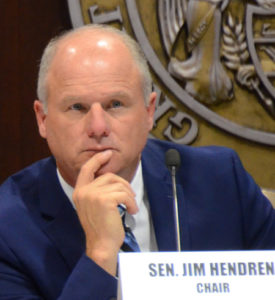
By Steve Brawner, © 2018 by Steve Brawner Communications, Inc.
What do these five numbers mean to you: $795 million; $230 million; $1.15; 0; and 1.5 million?
This year, they might mean a tax increase on cigarettes, both the old-fashioned kind and the e-cigarette kind. Or at least, they might should.
The first two numbers compare what tobacco products cost Arkansas taxpayers through the Medicaid program, $795 million, vs. what tobacco taxes raise, $230 million.
The Arkansas Center for Health Improvement says Medicaid spends $795 million annually to treat tobacco-related illnesses among adults ages 30 to 65. That number doesn’t include older Arkansans, young people, or pregnancy-related health issues.
However, the state’s tobacco taxes only raised about $230 million in 2017. That’s about $565 million less than what Medicaid is spending.
To be fair, tobacco companies and users also pay other taxes. However, tobacco-related illnesses also cost taxpayers through other government programs.
Sen. Jim Hendren, R-Sulphur Springs, has noticed this gap between costs and revenues. The Senate president pro tempore chaired the Tax Reform and Relief Task Force, a legislative group that studied proposed tax law changes last year.
While lawmakers will definitely cut income taxes these next few months, they also likely will refer to voters a ballot initiative with a tax increase or extension for highways. Hendren is wondering if it might be better to increase tobacco taxes to cover those health costs, and then use the newly freed money for highways.
“I think it’s worth at least having the discussion, which is, before we ask everyone to pay more gas taxes, do we want to at least consider, should those that are smoking by choice at least be asked to pay enough to cover the cost that tobacco-related illnesses bring to the taxpayers?” he told me Friday. “So I’m getting information. We’ll see.”
Hendren said Monday that he might be ready to present something by the end of the week. A tax increase would require a three-fourths vote of the Legislature, which is a high bar.
The third number, $1.15, is Arkansas’ current cigarette tax per pack. That’s much lower than the national average of $1.73, according to the Truth Initiative, a nonprofit public health organization.
Meanwhile, Arkansas has significantly higher smoking rates. According to the Campaign for Tobacco-Free Kids, 22.3 percent of adult Arkansans smoke compared to 14 percent nationally, and 13.7 percent of Arkansas high school students smoke, compared to 7.6 percent nationwide.
That’s not a coincidence. A fundamental economic principle is, if you want people to buy less of something, tax it and therefore raise the price.
The fourth number, 0? That’s how much e-cigarettes are taxed above the same sales tax Arkansans pay for duct tape.
That means Arkansas’ tax policy actively encourages people to use e-cigarettes versus the old-fashioned kind, while doing nothing to discourage their use. Only eight states and Washington, D.C., have an e-cigarette tax.
Which brings us to the fifth number: 1.5 million. That’s how many more young people used e-cigarettes in 2018 compared to the year before. According to the Food and Drug Administration and the Centers for Disease Control and Prevention, more than 3.6 million middle and high school students said they had used e-cigarettes in the past 30 days last year.
Smoking is no longer cool, but vaping apparently is.
The industry leader, JUUL, had gained 68 percent of the e-cigarette market as of June 2018, according to the Truth Initiative. The company says it’s targeting adult smokers with a safer alternative, but we don’t know how much safer it really is. The products contain nicotine and other chemicals. Plus, middle school students aren’t already adult nicotine users. They’re new, young ones, perhaps becoming addicted for life.
Hendren is looking at raising taxes on e-cigarettes as well. It might help fund the state’s highways and reduce the taxes raised elsewhere, which would be good.
It definitely would reduce the number of young people getting hooked on nicotine, which would be even better. Remember, if you want people to buy less of something, tax it.
The full page ads in the Demo-Zette touting JUUL e-cigarettes are sales tax exempt, as are all other forms of advertising in Arkansas, including radio, TV, & billboards.